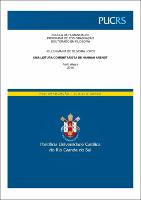| Compartilhe o registro |


|
Use este identificador para citar ou linkar para este item:
https://tede2.pucrs.br/tede2/handle/tede/8716| Tipo do documento: | Tese |
| Título: | Uma leitura comunitarista de Hannah Arendt |
| Autor: | Lopes, Hellen Maria de Oliveira  |
| Primeiro orientador: | Luft, Eduardo |
| Resumo: | Esta tese estabelece a relação entre o pensamento filosófico de Hannah Arendt e a teoria comunitarista. Para alcançar esta leitura comunitarista na filosofia de Hannah Arendt, analisa suas obras e apresenta sua crítica à modernidade, compreendendo que este período se apresenta predominantemente liberal. Apresenta a caracterização do indivíduo moderno que se manifesta em sua forma atomizada e alienada em relação aos assuntos comuns presentes na esfera pública. Analisa, a partir desta crítica, esse indivíduo moderno massificado associando- o àquele que serviu de base para a ascensão dos regimes totalitários. Aborda a análise de Arendt a respeito do conflito existente no surgimento da esfera social, apontando-a como uma esfera híbrida entre os assuntos privados e os públicos. Analisa, ainda, a crítica feita ao marxismo como teoria que não só reforçou o rompimento com a tradição de pensamento filosófico como visibilizou o que Arendt chamou de animal laborans, aquele indivíduo que vive para o trabalho e tem como principal questão a manutenção da sua vida em seus aspectos biológicos. A partir desse rompimento com a tradição, expõe a fragilidade em relação à ação política e à moralidade, o que garantiu que os regimes totalitários emergissem como nova lei na Terra. A ascensão desses regimes trouxe para o debate o conceito de banalidade do mal presente nas reflexões de Arendt a partir do julgamento de Adolf Eichmann. Contra o surgimento de uma análise pessimista ou niilista da filosofia de Hannah Arendt, apresenta seus conceitos, que buscam superar uma visão mais negativa dos acontecimentos por meio da reflexão do pensamento e do juízo, assim como Amor Mundi. A partir desses conceitos busca reconstruir a “confiança do homem no mundo” e apresenta o resgate do sensus communis, reinaugurando as questões que fizeram parte da tradição com o objetivo de que esta possa novamente lançar luz sobre os acontecimentos do presente, além de possibilitar a reconciliação entre filosofia e política – pensamento e ação. |
| Abstract: | This dissertation stablishes the relationship between the philosophical thinking of Hannah Arendt and the communitarian theory. In order to reach this communitarian reading of Hannah Arendt, we analysed her works and we shall present her criticism to modernity understanding that this period has presented itself as mainly liberal. We shall present the depiction of the modern individual that is manifested in its atomized form and alienated in relation to the common affairs of the public arena. We shall analyse starting from this criticism this modern massified individual relating him to the one that served as foundation to the rise of totalitarian regimes. We approached Arendt's analysis about the conflict that exists in the dawn of Social Sphere, refered as a hybrid sphere of private and public affairs. Plus, we analysed the criticism on marxism as a theory that not only enforced the split with the tradition of phylosophical thought but also made possible what Arendt coined animal laborans, the individual that lives for the labour and has as main problem the maintenance of his life in its biological aspects. Starting from this split with the tradition, we exposed the fragility in relation to political action and the morality that ensured the rise of totalitary regimes as the new law of Earth. The rise of those regimes brought to the debate the concept of the banality of evil in Arednt's thought from the judgment of Adolf Eichmann. Against the emergence of a pessimist or nihilist analysis of Hannah Arendt's philosophy we present her concepts that aim to overcome a negative view of historical events through the reflection of reasoning and judgement, just like Amor Mundi. From these concepts, we sought to rebuild the “trust of men in the world” and we shall present the rescue of sensus communis, inauguranting the questions that were part of the tradition with the objective that these might again shed light on the present events, and also allow the reconciling between philosophy and politics – thought and action. |
| Palavras-chave: | Comunitarismo Pensamento Juízo Ação Sensus Communis |
| Área(s) do CNPq: | CIENCIAS HUMANAS::FILOSOFIA |
| Idioma: | por |
| País: | Brasil |
| Instituição: | Pontifícia Universidade Católica do Rio Grande do Sul |
| Sigla da instituição: | PUCRS |
| Departamento: | Escola de Humanidades |
| Programa: | Programa de Pós-Graduação em Filosofia |
| Tipo de acesso: | Acesso Aberto |
| Restrição de acesso: | Trabalho será publicado como artigo ou livro |
| Prazo para liberar texto completo: | 36 meses |
| Data para liberar texto completo: | 14/06/2022 |
| URI: | http://tede2.pucrs.br/tede2/handle/tede/8716 |
| Data de defesa: | 22-Mar-2019 |
| Aparece nas coleções: | Programa de Pós-Graduação em Filosofia |
Arquivos associados a este item:
| Arquivo | Descrição | Tamanho | Formato | |
|---|---|---|---|---|
| TES_HELLEN_MARIA_DE_OLIVEIRA_LOPES_COMPLETO.pdf | HELLEN_MARIA_DE_OLIVEIRA_LOPES_TES | 1,08 MB | Adobe PDF |  Baixar/Abrir Pré-Visualizar |
Os itens no repositório estão protegidos por copyright, com todos os direitos reservados, salvo quando é indicado o contrário.




